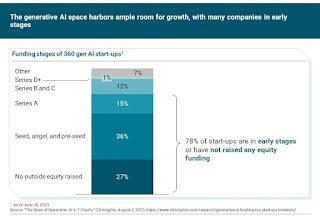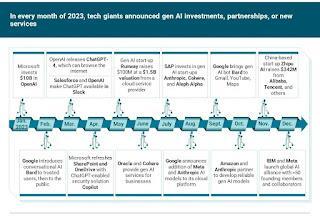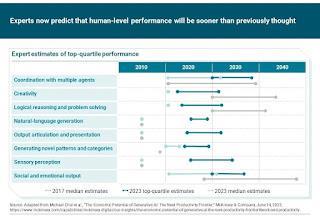




In2023, generative AI,or "genAI," had a historicyear. Tech firms creatednew tools, userusage increased significantly, investor interest raised funding to unprecedented heights, and technology kept advancing at a breakneck pace. Many use cases across functions and industries have arisen with proven capabilities on the market; these use cases even have the potential to revolutionize the Industrial sector.
It is now the responsibility of industrial enterprises to determine if they are ready to ride this wave of adoption and utilization of Gen AI. While many are still learning about and experimenting with this technology, the moment has come to start reaping its rewards. Even though real-world applications were far off, they are now possible and becoming more affordable as major international technology companies advance their generation AI learning platforms and models.
In 2023, there was a sharp increase in the use, funding, and executive excitement of general artificial intelligence. In contrast to other well-known IT products, ChatGPT, DALL-E, and Midjourney attained a million subscribers considerably more quickly. Millions of people have continued to use them every day since then, demonstrating their enduring popularity.
The attention of investors resulted in large increases in funding. Onerous $13 billion was awarded to corporations in the top five generation AI deals of 2023. The historic agreement between Microsoft and OpenAI was far in front. Five start-ups in this setting, namely Adept, Cohere, Runway, Character.AI, and Anthropologic, attained $1 billion or more in valuations, indicating both strong growth and investor confidence.
The general artificial intelligence (gen AI) market still has a lot of room to develop, even with several significant acquisitions having already been made (Exhibit 1). According to CB Insights statistics, 78% of 360 gen AI start-ups are still in the seed, angel, pre-seed, and series A fundraising stages or don't have any equity support.
Exhibit 1

Business executives were not blind to the dedication of investors. Leaders in significant industry domains such as technology, consumer products, and industrials have openly conveyed their fascination with the revolutionary potential of artificial intelligence. For instance, Nvidia CEO Jensen Huang stated to CNBC that "generative AI will make every application better."
Race of the Tech Giants
2023 was dubbed the year of partnerships by major digital businesses. The largest by far was the partnership between Microsoft and OpenAI, to which Microsoft contributed $29 billion. Microsoft invested $1 billion in the relationship with OpenAI in 2019 and furthered it with a $10 billion extension in 2023. The agreement now includes the Azure Cloud Service, premium supercomputers, and exclusive licenses.
Since then, the majority of market leaders, including Google, Salesforce, Oracle, SAP, Amazon, and IBM, have increased their investments in and partnerships with Generative AI (Exhibit 2), essentially starting an arms race in which the firms with the greatest financial resources to invest in cutting-edge tools and technologies will probably come out on top.
Exhibit 2

Entering the Next Phase of Growth
The next stage of growth for Gen AI is about to begin, and it will be marked by changes in monetization, faster performance, and technological breakthroughs. A prime illustration of how technology is developing is the ChatGPT chatbot from OpenAI. Over the course of a few years, ChatGPT has quickly changed. With almost 100 trillion parameters, the GPT-4 big language model it uses now resembles the intricacy of the neural connections found in the human brain.
AI performance has advanced faster than anticipated. Experts predict that human performance will arrive sooner than previously believed (Exhibit 3). MGI assessed adoption time periods for gen applications that may reach the median or top quartile of human performance, taking into account variables including regulation, investment levels, and management decision making. In 2017, median performance for certain capabilities—like natural language generation was already achievable. By the time of the 2023 estimations, median performance was reached for several domains, such as creativity and logical reasoning.
3

Nowadays, industry leaders are figuring out essential application cases. There are many potential for Industrials, but the adoption of Gen AI differs depending on the function and industry sector. IT is utilizing gen AI to the greatest extent across functions and is anticipated to take the lead in fully integrating gen AI into crucial functions. Furthermore, by 2025, a sizable portion of workers in the manufacturing, supply chain, marketing, sales, advertising, and product development departments anticipate use gen AI.
Industry-wide, the technology, media, and telecommunications sector uses gen AI the most and has the highest hopes for eventual full integration. Healthcare, commercial, legal, and professional services, as well as financial services, are additional industries with a high level of involvement with artificial intelligence. Not far behind is the industrial sector. Prominent corporations such as General Motors, Georgia-Pacific, BMW, Rockwell Automation, and Siemens have demonstrated a range of uses for Generative AI, ranging from the use of AI
chatbots to improve customer service to streamlining production procedures and fostering better human-machine interaction. Through strategic partnerships within the tech ecosystem, industrial enterprises may use the breakthroughs of tech giants and adopt specialized Generative AI solutions without having to make substantial technology expenditures themselves. This allows them to concentrate on driving efficiency and innovation through innovation.
Though there are risks associated with being an early adopter of any technology, the potential of Gen AI is enormous. Rapid acceptance and growth can have enormous benefits, but businesses must be ready to face issues with biases, errors, restrictions, and data security. Companies that are successful will be able to smoothly move into the business of the future.
Several businesses have already felt the effects of these hazards, and several have created countermeasures. Their background offers other industrial organizations advice on risk management strategies. For instance, a lot of businesses are putting in place policies for creating prompts, tracking and enhancing the performance of generative AI constantly, and getting legal counsel on risk reduction.
View Source:- https://aynaai.blogspot.com/2024/09/are-industrials-ready-to-ride-nextwave.html